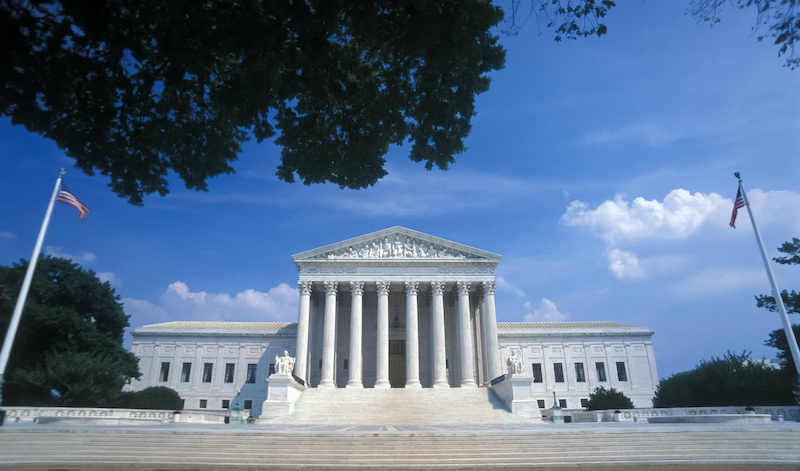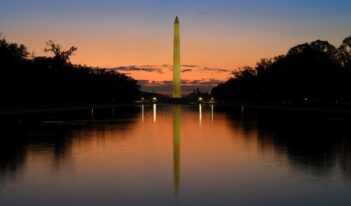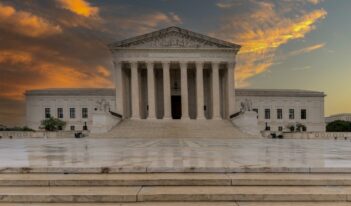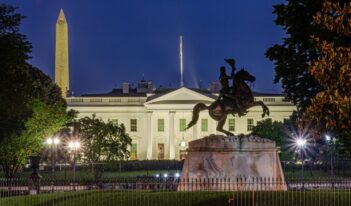
The Supreme Court is forcing a deregulatory agenda under the guise of restoring democracy.
The U.S. Supreme Court wants the public to believe that it has democracy’s back.
This is the unmistakable message from a series of recent decisions invalidating federal government actions, such as the vaccine-or-test mandate, that aimed to protect the public from serious threats to safety and health. The Court’s decision in the latest of these cases, West Virginia v. Environmental Protection Agency, presently pending before the Court and expected later this term, will almost certainly employ the same logic to bar the U.S. Environmental Protection Agency (EPA) from addressing climate change using language in the Clean Air Act. In these cases, the justices have suggested that, in constraining the powers exercised by federal regulators, they are doing nothing less than restoring the United States’s democratic promise.
But the claim that the Court’s conservatives are saving democracy is nothing more than a ploy to brand their idiosyncratic, antiregulatory substantive goals with the universally appealing ideals of revitalizing democracy. In reality, the available empirical evidence goes flatly against the idea that the Court can meaningfully improve the functioning of democracy through these kinds of decisions. My own recent work provides yet more reason to doubt that the Court can deliver on its promise. Especially in light of the Court’s cynical attempt to flip the script on critics who have rightfully pointed out the clear anti-democratic tendencies of the Court’s decisions on voting rights, gerrymandering, campaign finance, and unions, U.S. residents should not fall for it.
The unelected justices’ recent claims that they are defending democracy when they invalidate regulatory actions that a majority of the public supports might understandably be met with raised eyebrows. But the Court is invoking a long line of influential thinking in the legal world about supposed dysfunctions in how the U.S. Congress delegates legislative power to executive branch agencies. According to some of the justices, agencies such as EPA, the Occupational Safety and Health Administration, and U.S. Food and Drug Administration exercise too much power that Congress should exercise itself. The critics argue that allowing Congress to pass the buck to agencies through broad delegations that do not in themselves resolve hard questions allows Congress to evade democratic accountability for decisions that agencies ultimately make.
The conservative majority on the Court is staking out a bold claim based on these arguments: It alone can restore functionality to Congress by forcing Congress to do the hard work of legislating, rather than allowing Congress to continue passing that task on to agencies who are allegedly less accountable to voters.
The vehicle the Court is using in this campaign is the so-called major questions doctrine, which is effectively the handmaiden of a more overtly radical nondelegation doctrine used only in 1935 to strike down New Deal legislation. The contemporary major questions doctrine wrests decisions of great economic and political significance from administrative agencies acting under existing statutes and kicks them instead to Congress to authorize action in new, more specific legislation. In a recent case invalidating the Biden Administration’s extension of the COVID-19 eviction moratorium, the Court stated that it “expects Congress to speak clearly when authorizing an agency to exercise powers of vast economic and political significance.” If Congress has not spoken clearly enough for the Court, then the result is that nothing happens until Congress can regroup and pass a new law.
Although this logic sounds like the kind of statutory interpretation within the Court’s authority, in reality, the conservative majority is calling for Congress to write different statutes—ones that the justices are satisfied reflects more careful determination by Congress itself. In fact, some of the justices have expressed their preference for invoking the nondelegation doctrine to send Congress’s work back to it without even a pretense of statutory interpretation. In effect, the Supreme Court puts on its political hat and acts like it is the pivotal legislator.
Why insist on Congress writing better statutes? Because, allegedly, Congress evades accountability by letting agencies make all the important decisions. Justice Neil Gorsuch recently suggested in the vaccine-or-test mandate case that “lawmakers may be tempted to delegate power to agencies to ‘reduce the degree to which they will be held accountable for unpopular actions’” taken by “unelected agency officials.”
Importantly, this claim can appeal across the ideological spectrum, which is why the conservative justices want to make it. The ability to punt might allow Congress to take credit for seemingly ambitious legislation that will be lost during implementation by agencies, perhaps by design. Receiving scrutiny from the courts for this tactic would allegedly “encourage legislators to rewrite statutes to prompt agencies to provide more protection for the regulatory buck.” On this account, even pro-regulatory progressives might be tempted to view the Court’s decisions as constructive.
This appeal to democratic accountability concerns is dubious, given that the justices making it are appointed to life terms that insulate them from democratic checks. But let us assume Congress often writes statutes that delegate too many important questions to agencies and that this practice is a dysfunction that is desirable to eliminate. A big question remains: If the Court used the major questions doctrine—or even the unfiltered nondelegation doctrine—to stop agencies from acting under statutes that are not clear enough by the Court’s standard, could it induce Congress to serve as an agent of the people by legislating more, or at least more specifically?
Recent events give reason to doubt it. When the Supreme Court threatened Congress with invalidating the eviction moratorium last summer, Congress supported the eviction moratorium as a policy but failed to pass new legislation authorizing the Biden Administration to extend it. The Court held true to its threat and invalidated the Biden Administration’s stopgap extension of the moratorium, but the public remains stuck waiting for Congress to realize the ball is in its court.
Taking a broader view of available empirical evidence largely supports this skeptical stance on the likely efficacy of the Court’s project. In an article forthcoming in the Cornell Law Review, Elliott Ash and I examine actions at the level of state government, where the nondelegation doctrine has been invoked hundreds of times to invalidate statutes—unlike in the federal government, where it has never been used since the 1930s. Analyzing the clarity, specificity, and volume of statutory text that state legislatures have produced, we find that, at least by some measures, the legislatures delegated fractionally less and legislated slightly more when state supreme courts acted like the U.S. Supreme Court is currently acting. But we also find that the scale of this impact is grossly out of proportion with what the Court is promising in its talk of the major questions doctrine and the nondelegation doctrine. State use of the nondelegation doctrine explains a mere 1.5 percent of the use of delegating and imprecise language in state legislation.
This number is not nothing, as previous research has found. But it is likely disappointing for people who hoped that the Supreme Court could rescue democracy this way. As it turns out, the major questions doctrine and the nondelegation doctrine have about as much ability to shape legislatures’ drafting and accountability as simply changing the political environment surrounding the legislature through electoral means—the old-fashioned way of forcing democracy. The Supreme Court’s enforcement of the nondelegation doctrine, or its continued use of the major questions doctrine, might chip away at the most visible part of an iceberg of delegation, but the bulk would remain.
These findings should probably not be surprising. Legislatures, including Congress, are subject to many pushes and pulls as they go about their business. Ask Senator Joe Manchin (D-W.Va.) if he reads Supreme Court opinions and prioritizes them when mulling over a proposal like the Build Back Better Bill, and the answer is almost certainly “no.” In light of the various factors that compete for legislators’ attention and complicate the enterprise of drafting and passing statutes, it would be more surprising if legislatures responded in any fundamental way when the Supreme Court asks them to do it differently.
Our research matters for holding the Supreme Court accountable for the way it communicates with the public. If the Court persists in trying to link the major questions doctrine and the nondelegation doctrine to a systemically better functioning democracy, it will be doing so without any real empirical support.
It should be clear that these doctrines are based more on a deregulatory ideology than on any valid consideration that might be accepted by a majority of U.S. residents. These doctrines provide an ad hoc method for the Supreme Court to veto specific regulatory actions that it does not like. These doctrines are more about juristocracy than about democracy—rule by the Court rather than by the people.




